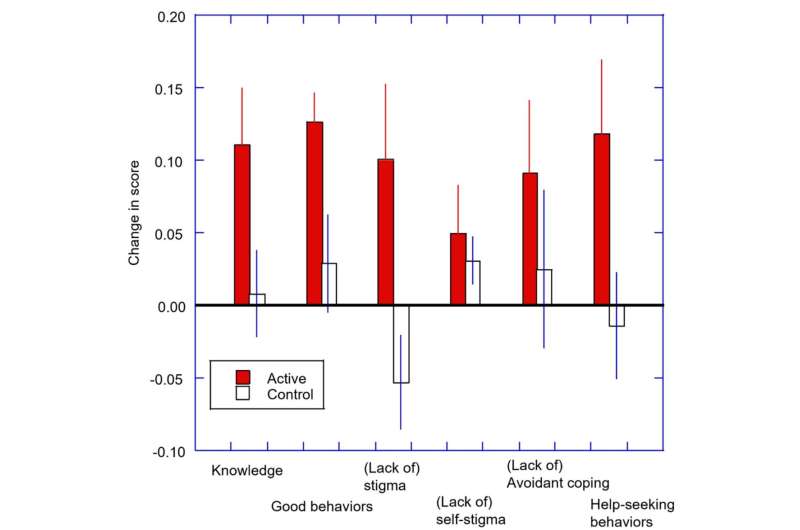This article has been reviewed according to Science X's editorial process and policies. Editors have highlighted the following attributes while ensuring the content's credibility:
fact-checked
peer-reviewed publication
trusted source
proofread
UK research shows the benefits of teaching pupils about mental health in the classroom

Giving schools the right resources and training to teach pupils about mental health really can have a positive impact on young people's well-being.
New research by Welsh academics has just been published demonstrating the benefits of improving pupils' mental health literacy and reducing the stigma around mental health issues at a crucial stage in a young person's life.
Most mental health problems start in the teenage years with a recent survey identifying that two in five young people report mental health symptoms. However, due to poor knowledge of mental health issues, and stigma about mental health, most young people do not seek help.
Against this background, the team from Swansea and Cardiff universities worked with charity Action for Children to develop mental health literacy program The Guide Cymru which consists of training for teachers, access to online resources and videos and classroom modules.
For the research a group of almost 2,000 pupils aged 13 to 14 from across Wales were divided in two for a 10-week randomized control trial with half of them experiencing The Guide delivered by specially trained teachers.
Its findings, which have just been published by BMC Public Health, showed the pupils given access to The Guide demonstrated improvements in nearly all areas, including mental health knowledge, better mental health behaviors, reduced mental health stigma and increased intentions to seek help for problems.
Swansea Ph.D. student and co-author Nicola Simkiss said, "It is devastating to see children and young people struggling with mental health difficulties that go both unreported and untreated."
"We believe The Guide is an effective intervention that can help both children and teachers understand that mental health problems are common-place, just like physical health problems, and that they should seek help and not try to hide the problem."
Swansea University's Professor Nicola Gray, who is also consultant clinical and forensic psychologist for Swansea Bay University Health Board, said, "The Guide is important as it can be easily delivered as part of the school curriculum by teachers who know the students."
She now hopes this will be the start of the process of embedding mental health education and intervention in schools: "The Guide can be the beginning of a process of open discussion about mental health and emotional challenges in schools, and how best our young people can learn about these problems and the most effective ways of seeking help when this is needed."
Brigitte Gater, Action for Children's Director for Wales, said, "To be able to show the benefits and impact of programs like The Guide through academic research is incredibly important. The intervention program is a significant tool in improving the mental health of our children and young people in Wales."
Chris Dunne, Children's Services Manager at Action for Children, added, "Children's mental health remains a priority area and we hope that the results of the research will encourage schools to use it as part of their curriculum."
Dr. Dave Williams, Adviser to Chief Medical Officer and Welsh Government—Child & Adolescent Mental Health, said, "The Guide has proved an excellent resource to enable professionals to raise understanding and awareness of emotional and mental health and well-being. It plays a part in the Welsh aim of normalizing emotional responses while building the capacity of communities to support children and young people who require specialist help."
Now the authors say they want to look to the future. Professor Robert Snowden, from Cardiff University, said, "The Guide did exactly what we had hoped it would. However, we need to follow up this research to see if these changes in knowledge and attitudes can translate into better mental health outcomes as these children develop from adolescents to young adults."
More information: Nicola J. Simkiss et al, A randomised controlled trial evaluating the Guide Cymru mental health literacy intervention programme in year 9 (age 13–14) school pupils in Wales, BMC Public Health (2023). DOI: 10.1186/s12889-023-15922-2



















